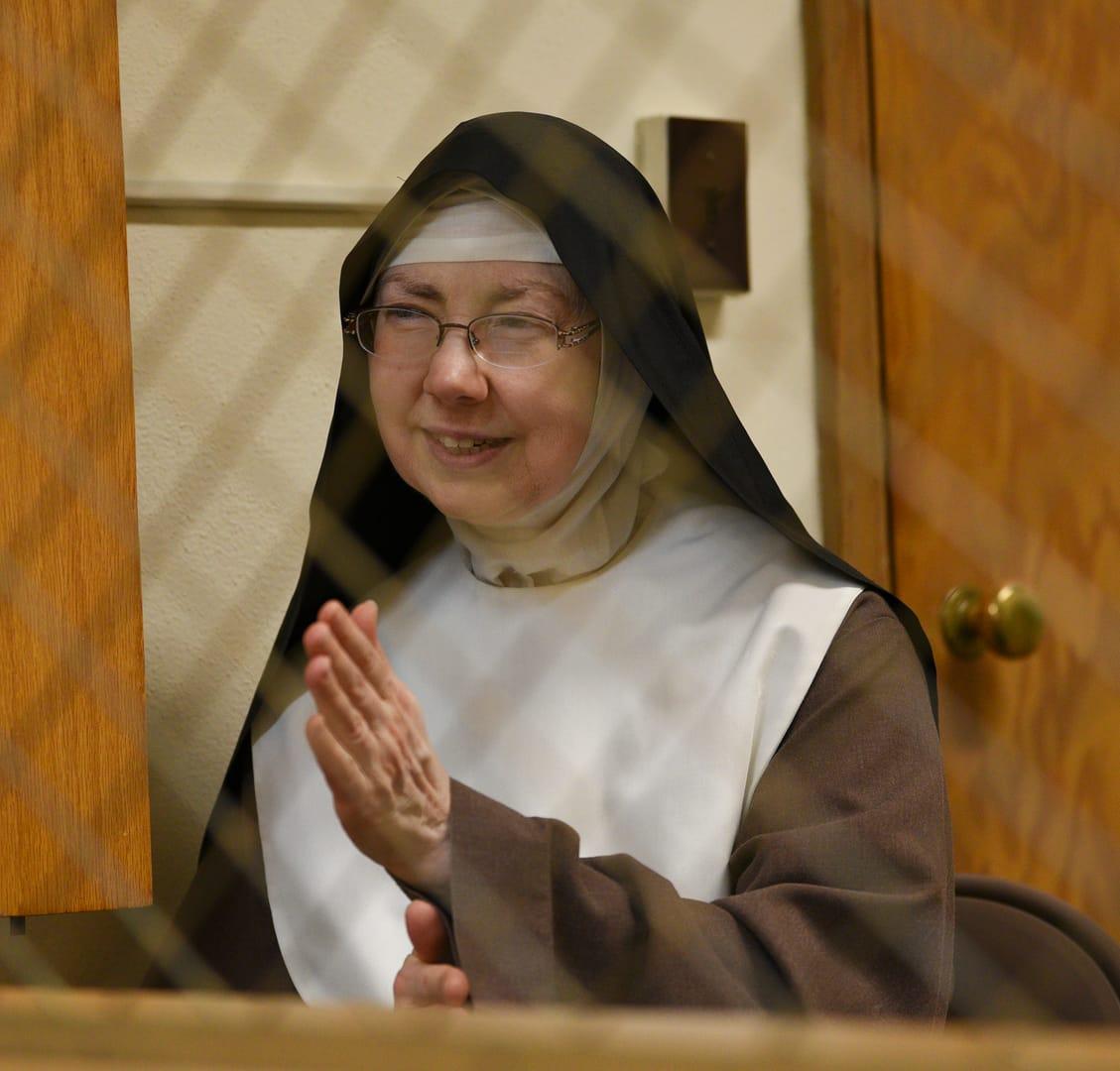SAUK RAPIDS, Minnesota — The sisters at St. Clare’s Monastery in Sauk Rapids abide by the three vows taken by all nuns: poverty, chastity and obedience.
But they also take a vow of enclosure, meaning they spend their entire lives behind the high walls surrounding the monastery, leaving only for emergencies or medical appointments.
That means they are experts on staying put — so Gov. Tim Walz’s stay-at-home order doesn’t change their daily lives. But for those outside the monastery — whose lives are disrupted by the COVID-19 pandemic — the sisters have some sage words.
Five sisters spoke to the St. Cloud Times in a parlor at the monastery, following both religious and state orders: They were separated by a lattice to follow the no-interaction rule and by 6 feet to follow social distancing rules.
“Our silence really helps a lot,” said Sister Mary Consolata, 68, who has lived at the monastery for 17 years. “It keeps us recollected in the Lord and prevents a lot of useless — sometimes not helpful — chatter. There is a great lot more peace with silence.”
Instead of feeling confined or isolated, the sisters say they find safety and security within the monastery.
“It’s a freedom,” said Sister Marie Elizabeth, 56, who has lived at the monastery for 22 years. “I feel more like a fish out of water when I have to go to the doctor’s office. There’s so much noise out there.

“I mean, out in the world you can be around a ton of people but still be very lonely,” she continued. “But that sense to me is not here. In the enclosure, we’re never by ourselves. We’re with Jesus all the time. He’s always present everywhere. There’s not that sense of loneliness.”
That idea holds true even for those who are not religious: The entire world is living through the shared experience of the pandemic so no one is really alone in it.
Although the stay-at-home order isn’t uprooting the sisters’ lives, the novel coronavirus has changed the content of many of their prayers.
“With COVID-19, people will come to the door and most will say, ‘Well, you know what to pray for.’ Everybody’s got the same major intention,” said Sister Mary Christiana, 43, who has lived at the monastery for 17 years.
Praying like it’s their job, because it is
The 16 sisters at St. Clare’s Monastery devote their lives to prayer.
“We pray seven times a day. That’s our job,” said Mother Marie Immaculata, 69, who has lived at the monastery for 39 years. She is the monastery’s abbess, the superior of the monastic community.
The sisters pray at midnight, then rise at 5:30 a.m. for morning prayer. A 7 a.m. Mass is followed by a breakfast of bread and water, milk or coffee and a midday prayer. After the main meal of the day, the nuns pray twice and have a work period for chores.
They then have an hour of recreation at 6:15 p.m.
“That’s when we talk,” Mother Marie Immaculata said, noting the sisters try not to speak during the day except for essential communication.
The sisters then pray again and retire to their bedrooms at 9:30 p.m. And at midnight, the schedule begins again.
Longing for peace
Mother Mary Barbara, 82, encouraged people find a routine to help with the angst and uncertainty stemming from the pandemic. Mother Mary Barbara, who has lived at the monastery for 27 years, is the vicaress, or assistant to the abbess.
She also suggested breaking the routine — just a little bit — for some joy: maybe having a root beer float or popcorn and spending time with family.
“That surely breaks the anxiety,” she said.
Before coming to St. Clare’s Monastery, Mother Mary Barbara was active in the community as a teacher for 33 years but was so busy and distracted she was losing touch with the Lord. She longed for peace.
“It’s what my heart wanted,” she said.
The sisters’ recommendations, based on experience and observation, follow that of mental health experts.
Local mental health professionals recommend establishing a routine and helping people, which releases dopamine and oxytocin in the brain. Other suggestions include taking the time to notice the good things and showing gratitude for them.

“Maybe now, without the distractions, without the hustle and bustle, it’s the time to focus on the present moment and live each moment … and be glad for it,” said Sister Marie Elizabeth.
The Poor Clares, who rely entirely on donations for survival, practice gratitude every day. The also rely on the outside world for updates on current events.
“Many friends in the community like to let us know what’s going on so we can pray,” Sister Marie Elizabeth said.
‘A community of contemplative nuns’
St. Clare’s Monastery was established in Sauk Rapids in 1924. It’s named after St. Clare, born in 1194 in Italy, who devoted her life to prayer and lived enclosed in a monastery, according to a book published by the monastery.
In 1875, two sisters of the Poor Clare Order came to the United States to establish a monastery. The first was established in Omaha, Nebraska, and then spread to New Orleans and British Columbia.

Mother Mary Angela O’Connor and six nuns failed to get permission to establish a monastery in northern Wisconsin so they instead came to Sauk Rapids after learning the bishop in St. Cloud was seeking “a community of contemplative nuns to offer their prayers and sacrifices for the spiritual welfare of the diocese,” the book states.
The sisters said they felt a strong calling from the Lord to join the monastery.
“None of us come, you know, running from the world because you have to face yourself here,” said Sister Marie Elizabeth.
Mother Marie Immaculata agreed: “It’s not an escape. But it is a haven.”
The sisters put their calling to good use, answering letters from across the state, nation and world.
“They are always filled with intentions for prayers,” said Mother Mary Barbara. “Something so marvelous about the letters, too, is I find is there are so many people who don’t ask for prayers for themselves. It’s always for their neighbor or somebody that’s sick or for the world or the church.”
Prayer also helps the sisters get through uncertain times.
“It keeps us so busy,” Mother Mary Barbara said. “We’re always focused on others.”
Along with the increase in prayer requests related to the pandemic, the sisters have noticed an increase in people coming together to help one another since the start of the COVID-19 outbreak.
“We’re getting a lot more people coming to the door and just saying, ‘Do you need anything? I’m checking with all the people I know if they need anything,’” said Sister Mary Consolata. “So there’s a lot of people out there who are looking after their neighbors and just trying to think of who they can help in this time. It’s very beautiful to hear all of this.”
















